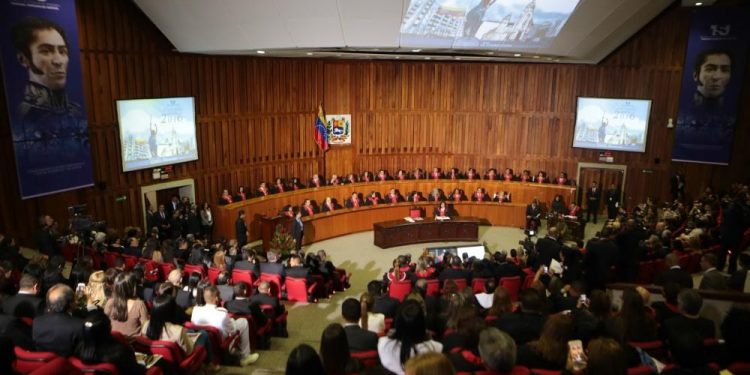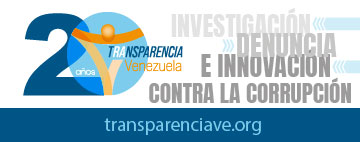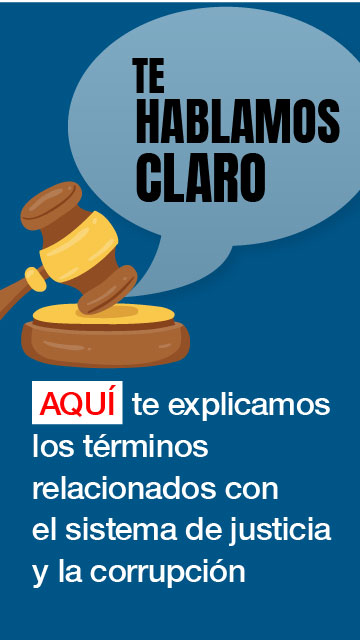Transparencia Venezuela calls on the representatives of the public powers who were stripped of their functions by the Constitutional Chamber of the Supreme Tribunal of Justice to defend democracy, separation of powers, respect for the rule of law and full validity of the Constitution. Failure to do so and to obey or execute any act that violates or impairs the rights guaranteed by the Constitution, will not only be complicit in the rupture of the democratic order, but will incur criminal, civil and administrative liability, as the case may be.
Caracas, 30 March 2017. Seven justices of the Constitutional Chamber of the Supreme Tribunal of Justice (SC-TSJ), 5 of whom were appointed in flawed processes, ended the separation of powers – a condition sine qua non of democracy – by giving President Nicolas Maduro the power to take civil, economic, military, criminal, administrative, political, legal and social measures that he consider pertinent and necessary, without consulting any other public power to «avoid a supposed state of disturbance.»
The perpetrators
The Justices Juan José Mendoza Jover, Arcadio Delgado Rosales, Carmen Zuleta de Merchán, Calixto Ortega Ríos, Luis Fernando Damiani Bustillos, Lourdes Benicia Suárez Anderson and Federico Sebastián Fuenmayor Gallo (in substitution of Gladys Gutiérrez) signed together, the ruling 155 of the Constitutional Chamber of the TSJ, which gives all power to the president of the republic and declares traitors to the country the Members of Parliament for requesting the implementation of the Inter-American Democratic Charter.
These Justices became unconditional allies of the national government interests and, finally, they have ended with the democracy, sustained in the rule of law and in the separation of the powers. It is striking that Justice Gladys Gutiérrez, who was Chief Justice for more than 4 years and member of this chamber, had not taken part in a ruling as critical as this one.
Know in detail each one of these Justices in our website Suprema Injusticia.
These seven Justices crowned Nicolas Maduro as the hierarch of Venezuela, transferred him national sovereignty and handed him over the functions of the entire National Public Power.
Today, the human rights of 31 million Venezuelans, their constitutional guarantees and the full validity of the rights conferred in the Constitution itself, are in the hands of President Maduro, who can legislate, administer the republic’s assets and enter into contracts without any restriction or control, to put the country into debt, may even request the imprisonment of Members of Parliament, but certainly, in the immediate future, any person who opposes his interests.
The ruling, the most serious legal aberration
PSUV’s (ruling party) Member of Parliament, Héctor Rodríguez, requested the «nullity» of the Agreement on the Reactivation of the OAS’ Inter-American Democratic Charter, approved by the parliament on 21 March. The Constitutional Chamber, without respecting the procedural, constitutional and legal forms and in total disobedience of the due process’ minimum guarantees, declared in only 3 working days, the nullity of the agreement in its ruling N ° 155, based on the arguments exposed by the plaintiff, and considered that it was necessary to initiate an «ex officio» opening of an «unnamed constitutionality control process», which is not established in the legal system but can be interpreted as unlimited control.
The ruling determined that the Members of Parliament elected by the Venezuelan people in December 2015 are not protected by parliamentary immunity «due to their continued contempt» and to the execution of actions described as «treason to the homeland.» It also granted the President the power to legislate and, mentioning in particular the laws against Organized Crime and Financing of Terrorism, Against Corruption, Criminal and Criminal Procedure Codes and even the Organic Code of Military Justice. Finally, it ordered the head of state to evaluate the behavior of the international organizations to which the republic belongs, raising the possibility of the country of withdrawing from these organizations.
The ruling ratifies that in this government, the Judicial Branch is an operational arm of the president of the republic, as we have denounced once again in the most recent hearings before the Inter-American Commission on Human Rights of the OAS, on 22 March (Read more here).
Together with seven other social organizations of the Red Justicia (Justice Network), we presented in December last year the Memorial de Agravios del Poder Judicial (Judicial Branch’s Grievances Compendium), a compilation of more than 100 rulings that shows that the Justices of the Supreme Tribunal of Justice are not impartial and therefore they are out of keeping with the principles and norms enshrined in the Constitution and laws, thereby damaging fundamental rights of different groups of citizens to favor the Executive Branch. (Read more here)
Ruling 155 of the Constitutional Chamber represents the worst attack of the 53 that this Supreme Tribunal has given in little more than a year against the parliament and its members, chosen by almost 14.5 million Venezuelans in December 2015. This set of rulings has annulled all the legislative body’s actions and has deprived it of its own powers.
There is no treason to the homeland
Requesting the application of the Inter-American Democratic Charter of the Organization of American States (IDC-OAS), as the Members of Parliament did at the 21 March parliamentary session, cannot constitute a crime and much less «treason to the homeland», all since the Charter is no more than an international legal instrument signed by Venezuela which represents the broadest commitment of the governments of the region to the rule of law and democracy. Therefore, allowing and accepting that the Justices of the Constitutional Chamber assert that the IDC-OAS request is «unconstitutional» and constitutes «treason to the homeland,» means accepting the violation of the human rights progressiveness principle.
The adjective of traitors to the homeland that have received the Venezuelan Members of Parliament is not directed exclusively to them, but it also covers the whole society and each of its citizens, who in exercise of their human and constitutional rights can declare themselves in favor of the return to the Venezuelan constitutional order and the enforceability of the IDC-OAS. The ruling sets a negative precedent and any citizen who invokes such rights could be charged without trial and without due process.
The end of the fight against corruption
In 2016 and 2017, the Supreme Tribunal has not only dismissed anti-corruption actions, but has not prosecuted those who attempt against the public treasury. It has not only repeatedly rejected requests for information about alleged corruption, including cases involving contracts with Odebrecht (which admitted paying $ 98 million in bribes in Venezuela), but also issued rulings in which considers legal that the presumed acts of corruption related to the payment of commissions in foreign currency in the contracting of the work of a thermoelectric power plant, remain in shadow, and has prevented the Venezuelan parliament from investigating serious administrative irregularities in PDVSA (the national state-run oil company) that may have caused enormous damage to the nation’s treasury.
Nevertheless, in the ruling 155, when the Supreme Tribunal deprives the National Assembly (Venezuelan parliament), the Offices of the Comptroller General of the Republic and of the Attorney General of their constitutional powers and place them in the hands of the President, the Supreme Tribunal has eliminated the accountability and the independent comptrollership, has increased discretion and conflict of interest, which has increased the risks of corruption in the country.
As the separation of powers is further weakened, to the point of «ordering» the president to assume the attributions of the rest of the public powers, the balance that must exist between them and the one that prevents the interference of one in the field of the other comes to its end.
Public appeal for respect and protection of institutionalism, democracy, transparency and the guarantee of human rights
In the face of such arbitrariness and misuse of power, Transparencia Venezuela appeals to all representatives of the National Public Power and especially to members of the Citizen Power (Office of the Attorney General, Office of the Ombudsman and General Comptroller of the Republic) to exercise and defend their attributions, to categorically reject the content of this ruling and demand the return of democracy.
It is time to defend the country, it is time to defend human rights, it is time to defend transparency, the Constitution and the rule of law, it is time to understand that when all powers are given to a single person and all the decisions of the national life are left to its absolute discretion, we are all at risk, because it is a permission to act outside the Constitution.
Defending human rights, defending democracy and even implementing treaties signed by Venezuela is an unavoidable duty of all Venezuelans.








